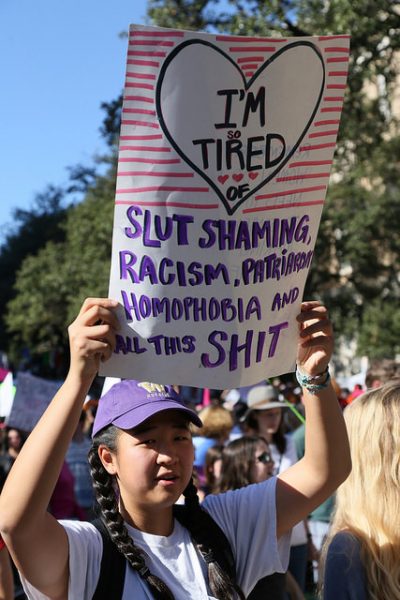
Originally posted February 26, 2018.
Justin Timberlake’s recent performance at the Super Bowl Halftime Show wasn’t his first. Who can forget the now infamous “wardrobe malfunction,” when Timberlake tore Janet Jackson’s clothing, exposing her breast to millions across the United States? Jackson was subsequently blacklisted from the mainstream entertainment industry, while Timberlake’s career continued to flourish. To illustrate the gendered and racial double standards in this case, Black Twitter created the hashtag #JanetJacksonAppreciationDay. Yet, the music industry is not unique. Despite significant progress since the sexual revolution, research shows that sexual double standards persist between women and girls, and men and boys.
Women and girls experience social stigma for premarital sexual activity, having multiple sexual partners, and even participating in non-physical interactions like sexting. Men and boys, conversely, encounter praise for engaging in similar (hetero)sexual conduct. For example, one study showed peers were less likely to accept adolescent girls with a high number of sexual partners, but more likely to accept boys with several sexual partners. At the same time, boys who failed to engage in multiple sexual ‘conquests’ endure stigma from peers. So, both sexually permissive girls and sexually inactive boys face social consequences for not following heterosexual gender roles.
- Derek A. Kreager and Jeremy Staff. 2009. “The Sexual Double Standard and Adolescent Peer Acceptance.” Social Psychology Quarterly 72(2): 143-164.
- Jessica Ringrose, Laura Harvey, Rosalind Gill, and Sonia Livingstone. 2013. “Teen Girls, Sexual Double Standards and ‘Sexting’: Gendered Value in Digital Image Exchange.” Feminist Theory 14(3): 305-323.
Women who engage in casual sexual activity like hookups outside of a committed relationship, are often judged more harshly and called derogatory names like ‘ho’ and ‘slut.’ One study participant noted, “Guys, they can go around and have sex with a number of girls and they’re not called anything” (Hamilton and Armstrong, p. 598). Both women and men, however, may encounter negative attitudes for hooking up. According to one study, almost 50 percent of college-aged respondents indicated that they lost respect for women and men that engage in a lot of casual sex. However, men were still more likely to only stigmatize women for engaging in casual sex.
- Laura Hamilton and Elizabeth Armstrong. 2009. “Gendered Sexuality in Young Adulthood: Double Binds and Flawed Options.” Gender & Society 23(5): 589-616.
- Rachel Allison and Barbara J. Risman. 2013. “A Double Standard for ‘Hooking Up’: How Far Have We Come Toward Gender Equality?” Social Science Research 42(5): 1191-1206.

Comments